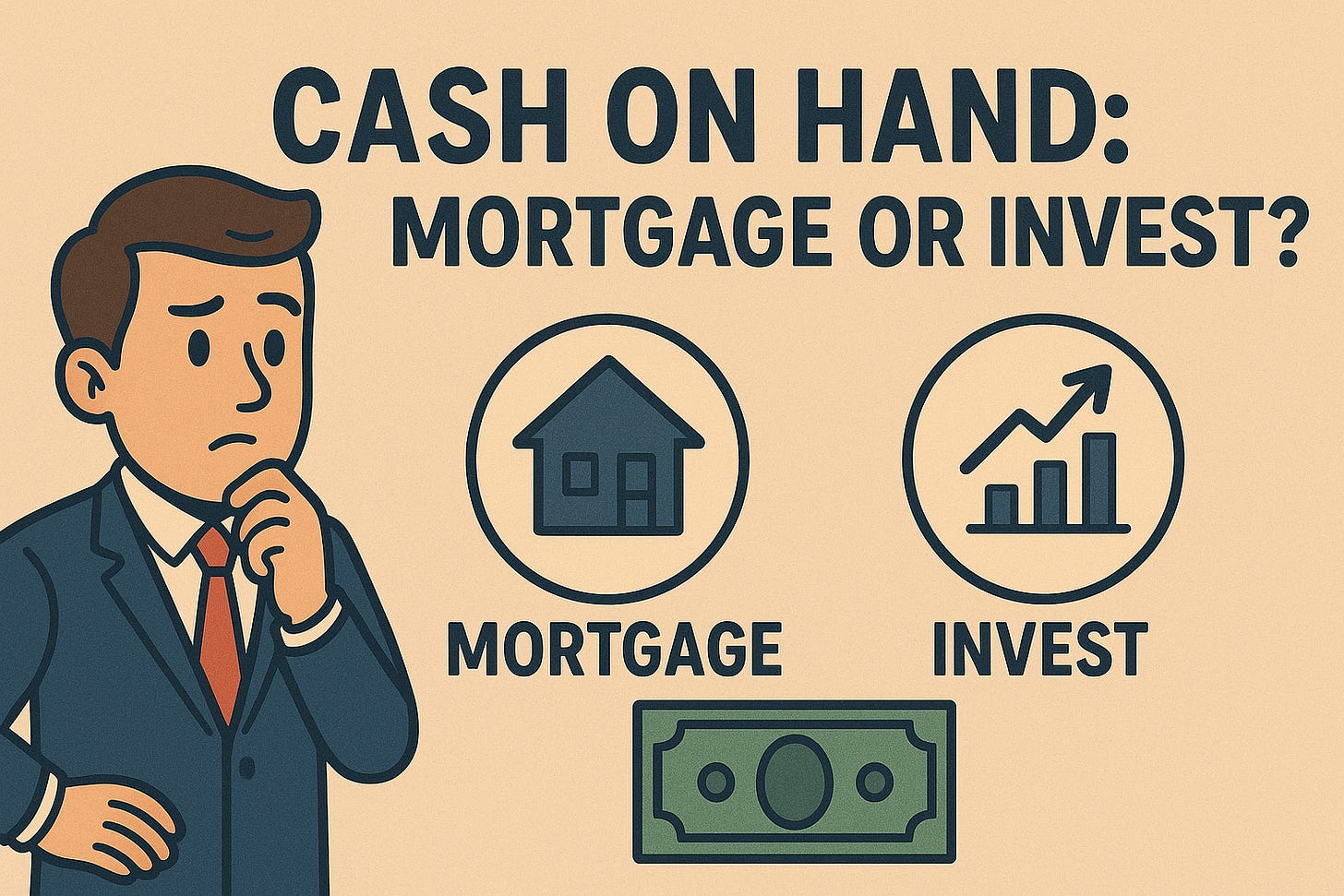Cash on hand: Mortgage or Invest?
Should You Pay Off Your Home Loan Early or Invest?
Dear Investor,
Zee here. Numerous mentees have asked me this: If you have a home loan and some extra money each month, Should you play it safe by reducing your mortgage, or aim higher by investing instead?
Now, this isn’t just about numbers but how you feel about debt, your comfort with risk, and what gives you peace of mind.
Let’s explore both options in simple terms.
On 28 Oct, we’ll be conducting a live webinar on “How to Invest in 2026, and Our Outlook for the Year Ahead.”. We’ll also break down a stock that’s recently dropped but may be setting up for a turnaround.
Understanding Your Choices
When you have extra cash, you have two main options:
Option 1: Put extra money toward your home loan to pay it off faster
Option 2: Keep making your regular monthly payments, but invest the extra money
Option 1: Paying Extra on Your Home Loan
Many people choose to pay extra on their home loan whenever possible. This feels safe and straightforward.
The Benefits
You save money on interest: If your loan charges 4% interest, every extra dollar you pay saves you 4% in interest costs. This is a guaranteed return with no risk.
You feel relief: Watching your debt go down feels good. Many people sleep better knowing they owe less money.
You own your home sooner: By paying extra, you could own your home years earlier than planned and save thousands in interest payments.
You might access the money later: Some flexible home loans let you withdraw extra payments if you need them in an emergency.
The Drawbacks
You miss other opportunities: That guaranteed 4% return looks good, but historically, investing in the index has returned 8-15% per year over the long term.
You might become “house rich, cash poor”: If all your money goes into your home, you may not have enough savings or investments for other needs.
Your money grows slowly: Paying down debt saves you interest, but it doesn’t grow your wealth the way investing can.
Access to your money isn’t guaranteed: Even with flexible loans, banks may limit how much you can withdraw or charge fees.
Option 2: Investing the Extra Money
The alternative is to keep making your regular loan payments but invest any extra money in stocks, funds, or other assets.
The Benefits
Higher potential returns: Investing in the index has returned 8-15% per year over the long term. Over decades, this usually beats the 4% you save by paying off your loan early.
You control your money: Your investments are yours to access, sell, or move around as needed.
You build real wealth: Invested money can grow significantly over time through compound returns, potentially creating much more wealth than you’d save on interest.
You spread your risk: Most homeowners already have most of their wealth in their home. Investing helps you diversify.
The Drawbacks
No guarantees: Markets go up and down. You could lose money in the short term, and there’s no promise you’ll earn 10-15% per year.
You need discipline: It’s easy to say you’ll invest, but harder to actually do it consistently. Many people end up spending the money instead.
A Real Example
Let’s say you have a $500,000 home loan at 4% interest with 25 years remaining. You can spare $1,000 per month.
If you pay extra on your loan:
You save about $121,000 in interest over the life of the loan
You pay off your home about 10 years early
If you invest that money instead (assuming 8% annual returns):
After 25 years, you’d have about $877,000
Even with lower 6% returns, you’d still have about $658,000
The difference is dramatic. Paying extra on your loan gives you security and peace of mind. Investing could build significantly more wealth, but with more uncertainty.
It’s Not Just About Numbers
Money decisions aren’t purely mathematical. Your emotions matter too.
Some people can’t relax knowing they owe money to the bank. For them, being debt-free is worth more than any investment return. The psychological freedom is priceless.
Others are comfortable with debt and see market ups and downs as normal. They’d rather have their money working harder in investments than saving 4% on a loan.
Neither approach is wrong. It depends on what helps you sleep at night.
My Personal Approach
I choose to invest rather than pay extra on my home loan. Here’s why:
The opportunity cost is too high: With loan rates relatively low, I believe my money will grow more in the stock market over the long term.
I want flexibility: A home is valuable but hard to convert to cash quickly. By building investments alongside my loan, I have assets I can access if needed.
The Bottom Line
There’s no single right answer. The best choice depends on:
Your financial goals
How comfortable you are with risk
Whether you value peace of mind or wealth growth more
Your discipline to actually invest (not just spend) the money
For some people, the comfort of being debt-free is most important.
For others, the chance to build greater wealth through investing is more compelling.
Disclaimer:
All information here is for educational purposes only. This is not financial advice. Please do your own research and speak with a licensed advisor before making any investment decisions. Past performance is not indicative of future returns. How we invest may not suit your investment goals and risk management profile.


